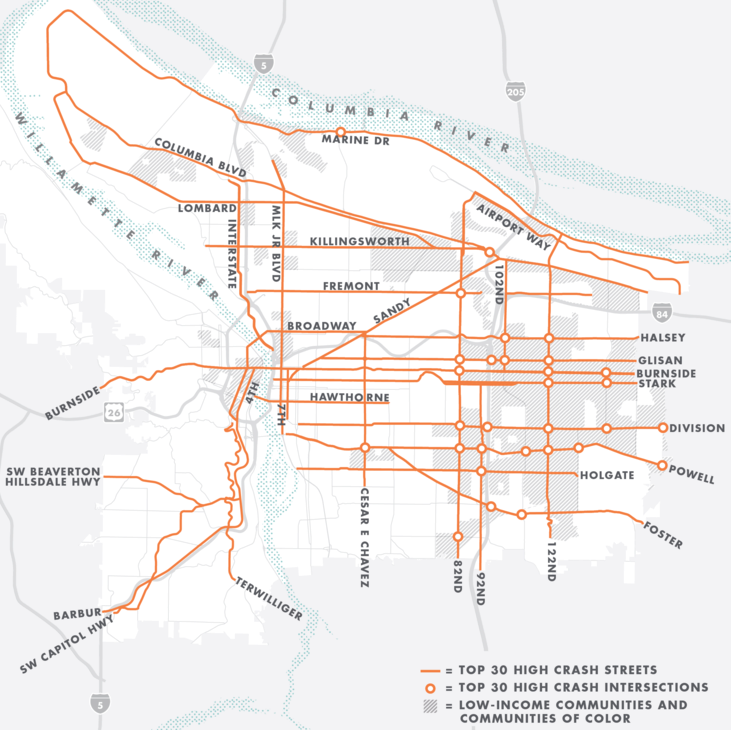Mayor Ted Wheeler invoked an emergency declaration to prohibit people from living along many major streets where people camp often seeking visibility as a form of safety.
It’s one thing to read “any state or federal highway in Portland’ or any “High Crash Network Streets and Intersections” as an abstraction, and it’s another to look at the map he is referring to, and realize how many people will be dislocated without additional housing to offer them.
Camping is banned “within a dangerous proximity of” Airport Way, Barbur, Broadway, Burnside, Cesar Chavez, Columbia, Division, Foster, Fremont, Glisan, Hawthorne, Halsey, Holgate, Killingsworth, Interstate, Lombard, Marine Drive, Powell, Sandy, Terwilliger, 82nd, 92nd and 122nd.
He pinned the decision on the tragically high number traffic deaths of unhoused people, although he admitted to OPB that his ban on camping was already underway.
The Portland Bureau of Transportation issued a report last week showing 19 people killed by automobiles in Portland last year were experiencing homelessness, comprising 70% of all pedestrian deaths.
It’s the first year PBOT tracked the housing status of people who died, and I laud that work. The Domicile Unknown report that Street Roots publishes every year with Multnomah County has been about mourning those who are dead and also analyzing the circumstances of those deaths to consider what can be done.
So that’s why Street Roots advocacy turned to transit and pedestrian justice colleagues – including Oregon Walks and Street Trust – who proposed a number of concrete steps, such as reducing speed limits to 20 mph on all city-owned facilities and roadways; completing a number of slated projects in PBOT’s High Crash Network; and enforcing the “vision clearance” of approximately 350 intersections citywide, beginning with those located on high crash network streets.

The high crash network streets are described in the PBOT report as the 8 percent of streets that account for 60 percent of all accidents that happen. None of the mayor’s actions in the emergency declaration would immediately address how cars operate on our streets.
He chose instead to fund even more of the interminable cycle of camp sweeps — without adding places for people to actually go. While in his emergency declaration he ordered the Joint Office of Homeless Services to offer 100 existing shelter beds, he could actually use the emergency powers to increase residences for people who have none.
I’m not suggesting that’s easy, but there are approaches that could cut a faster path alongside the slower production of affordable housing.
The same emergency declaration he evoked to move people experiencing homelessness provides power to “provide temporary or permanent housing by purchase, lease or otherwise and to enter into arrangements necessary to prepare or equip the living units for occupancy.”
Project Turnkey — the $65 million statewide project administered by Oregon Community Foundation to rapidly transform 19 motels into shelters and housing owned by cities, counties and nonprofits — is a project that could be replicated on a city level. In its five-point roadmap, the HereTogether coalition suggests it could rapidly create private shelter spaces for up to 1000 people.
Instead, the mayor’s order is about policing space without adding safe dwellings. It’s important to point out that the budget increase for funding Rapid Response sweeps came from the surplus allotted last fall. I didn’t see any mention of increasing outreach staff to connect people to shelters in the mayor’s order.
I’d like to see really constructive, brave proposals. There’s so much presupposition that unhoused people have to be policed — without actually having the housing to offer people anyway.
The New York Times reported Steven Banks, who recently stepped down from serving as the New York City’s Commissioner of Social Services, even began exploring purchasing some buildings using eminent domain. The action prompted a set of landlords to decide “they didn’t want to test his argument in court,” instead selling the 45 buildings “totaling more than 1,700 apartments, for use as permanent affordable housing” to nonprofits assisted by the Department of Social Services.
We need an indefatigable commitment to the well-being of the poorest people in the city. I’m concerned that too many actions cater to perceptions of people who aren’t homeless, rather than the well-being of people who are.


